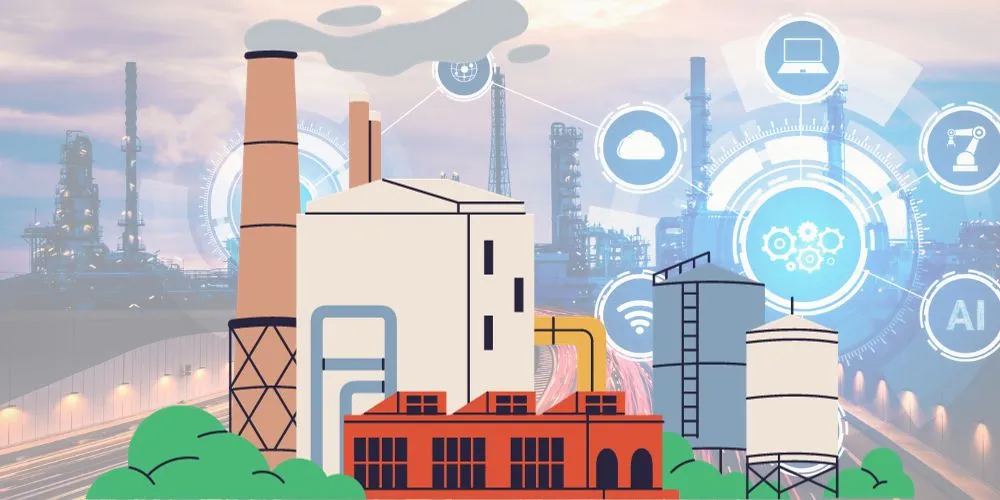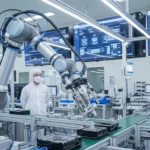Industry 4.0 is a transformative force in modern industrialization, revolutionizing how we conceptualize and execute manufacturing processes. This article explores the intricacies of Industry 4.0, unraveling its significance, key technological components, its impact on various industries, and the potential it holds for the future of manufacturing.
The Significance of Industry 4.0
Industry 4.0 signifies a paradigm shift in manufacturing, integrating cutting-edge technologies to create smart, interconnected, and data-driven production environments. This shift represents a departure from traditional manufacturing methods, ushering in an era where cyber-physical systems collaborate seamlessly to enhance operational efficiency and responsiveness.
The Fusion of Digital and Physical Systems
At the core of Industry 4.0 is the seamless integration of digital technologies with physical systems. This fusion enables manufacturing systems to leverage real-time data analytics, automation, and connectivity, thereby creating a dynamic and responsive production ecosystem. The convergence of the physical and digital worlds enables manufacturers to make data-driven decisions, optimize processes, and achieve levels of efficiency previously thought unattainable.
Enhanced Efficiency and Productivity
One of the primary goals of Industry 4.0 is to enhance efficiency and productivity across the manufacturing value chain. Through the utilization of advanced technologies like the Internet of Things (IoT) and artificial intelligence (AI), processes become streamlined, downtime is minimized, and productivity reaches unprecedented levels. By leveraging real-time data analytics, manufacturers can identify bottlenecks, predict maintenance needs, and optimize operations for peak performance.
Customization and Flexibility
It enables a shift from mass production to highly customized manufacturing. Smart factories can adapt to changing demands, enabling flexible production lines and the efficient production of small batches of diverse products, thereby meeting the evolving needs of the market. This level of customization meets consumer demands for personalized products, enhancing overall operational agility and enabling manufacturers to respond rapidly to market changes and trends.
Key Technological Components of Industry 4.0
The implementation of Industry 4.0 relies on a synergy of key technological components that work in tandem to create intelligent and interconnected manufacturing ecosystems.
Internet of Things (IoT)
IoT forms the backbone of Industry 4.0, connecting physical devices and sensors to collect and exchange data. This connectivity facilitates real-time monitoring, predictive maintenance, and data-driven decision-making, optimizing operational efficiency. The proliferation of IoT devices throughout manufacturing enables a comprehensive network of interconnected systems, providing a holistic view of operations and fostering informed decision-making.
Artificial Intelligence and Machine Learning
The integration of AI and machine learning algorithms enhances the cognitive capabilities of manufacturing systems. These technologies enable predictive analytics, quality control, and autonomous decision-making, paving the way for self-optimizing production processes. Machine learning algorithms can analyze vast datasets to identify patterns, predict equipment failures, and continuously improve processes, contributing to a more intelligent and adaptive manufacturing environment.
Additive Manufacturing (3D Printing)
Additive manufacturing plays a pivotal role in Industry 4.0 by enabling the precise creation of complex components. 3D printing enables rapid prototyping, reduces waste, and facilitates on-demand production, revolutionizing traditional manufacturing processes. This technology opens new possibilities for design innovation, as intricate and customized components can be produced quickly and efficiently.
Impact on Various Industries
The influence of Industry 4.0 extends beyond the manufacturing sector, permeating various industries and reshaping how businesses operate.
Smart Supply Chains
It transforms supply chains into smart, interconnected networks. Real-time data exchange and predictive analytics optimize logistics, inventory management, and demand forecasting, ensuring a more responsive and efficient supply chain. Smart supply chains enable manufacturers to achieve greater visibility into their operations, reduce lead times, and enhance overall supply chain resilience.
Healthcare and Industry 4.0
In the healthcare sector, Industry 4.0 introduces smart manufacturing principles to medical device production, pharmaceuticals, and personalized healthcare solutions. Automation, data analytics, and connectivity enhance the efficiency of healthcare manufacturing processes, leading to improved patient outcomes. From the production of precision medical devices to the customization of pharmaceuticals, it plays a pivotal role in advancing healthcare technologies.
Smart Agriculture
Agriculture embraces Industry 4.0 through precision farming and smart agriculture practices. IoT-enabled sensors monitor soil conditions, crop health, and equipment performance, allowing data-driven decision-making to optimize agricultural processes and resource utilization. Smart agriculture contributes to sustainable farming practices, improving yield, reducing environmental impact, and ensuring the efficient use of resources.
Future Prospects and Challenges
As Industry 4.0 continues to evolve, its trajectory presents exciting possibilities and challenges that must be navigated for widespread adoption.
Cybersecurity Concerns
The increased connectivity in Industry 4.0 raises cybersecurity concerns. Protecting sensitive data and manufacturing systems from cyber threats becomes paramount to ensure the integrity and security of smart factories. Robust cybersecurity measures, including encryption, secure access controls, and regular vulnerability assessments, are crucial for safeguarding against potential cyber threats and unauthorized access.
Workforce Transition and Training
The advent of Industry 4.0 necessitates a workforce equipped with digital skills. Training and upskilling programs are essential for empowering the workforce to adapt to the evolving technological landscape and operate effectively within smart manufacturing environments. Collaboration among industries, educational institutions, and policymakers is essential to develop comprehensive training programs that bridge the digital skills gap and facilitate a smooth transition to Industry 4.0.
Sustainable Manufacturing Practices
Industry 4.0 provides an opportunity to integrate sustainable practices into manufacturing processes. Efficient resource utilization, reducing waste through additive manufacturing, and smart energy management contribute to environmentally conscious production. Sustainable manufacturing practices align with global efforts to reduce environmental impact and create a more eco-friendly and socially responsible industrial ecosystem.
Conclusion
Industry 4.0 represents a groundbreaking chapter in the evolution of manufacturing, where digitalization, connectivity, and intelligence converge to redefine industrial processes. As industries embark on this transformative journey, the smart factories of Industry 4.0 promise increased efficiency, customization, and responsiveness. Navigating the challenges and embracing the opportunities presented by Industry 4.0 will undoubtedly shape the future of manufacturing, heralding an era of unparalleled innovation and technological advancement.





